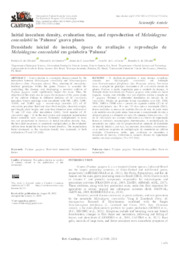Initial inoculum density, evaluation time, and reproduction of Meloidogyne enterolobiiin Paluma guava plants.
Initial inoculum density, evaluation time, and reproduction of Meloidogyne enterolobiiin Paluma guava plants.
Autoria: OLIVEIRA, P. G. de; QUEIROZ, M. A. de; LIMA NETO, I. da S.; CASTRO, J. M. da C. e; OLIVEIRA, R. S. de
Resumo: Guava decline is a complex disease caused by the interaction between Meloidogyne enterolobii and Neocosmospora falciformis (Syn.: Fusarium solani). Thus, selecting M. enterolobii-resistant genotypes within the genus Psidiumis essential for controlling this disease, and developing a resistant cultivar of Psidium guajava could significantly impact this issue. Thus, the objective of this study was to assess the response of the guava plants of the cultivar Paluma to different densities of M. enterolobii inoculum. Guava seedlings were inoculated with 500, 1,000, 5,000, 10,000, and 20,000 eggs + second-stage juveniles (J2) of M. enterolobii per plant. Root and shoot fresh weights, shoot dry weight, root length, plant height, and stem base diameter were evaluated at 70 and 135 days after inoculation (DAI). Total number of M. enterolobii eggs + J2 in the root system and nematode reproduction factor nematode were assessed. Nematode multiplication in roots was not proportional to increases in initial inoculum density; thus, the best plant responses to nematode multiplication in the evaluated cultivar were found for the lowest tested densities. The reproduction factor decreased as the inoculum density was increased, at both evaluations (70 and 135 DAI).
Ano de publicação: 2024
Tipo de publicação: Artigo de periódico
Unidade: Embrapa Soja
Observações
1 - Por padrão são exibidas publicações dos últimos 20 anos. Para encontrar publicações mais antigas, configure o filtro ano de publicação, colocando o ano a partir do qual você deseja encontrar publicações. O filtro está na coluna da esquerda na busca acima.
2 - Para ler algumas publicações da Embrapa (apenas as que estão em formato ePub), é necessário ter, no celular ou computador, um desses softwares gratuitos. Sistemas Android: Google Play Livros; IOS: iBooks; Windows e Linux: software Calibre.
Acesse outras publicações
Acesse a Base de Dados da Pesquisa Agropecuária (BDPA) para consultar o acervo completo das bibliotecas da Embrapa.

